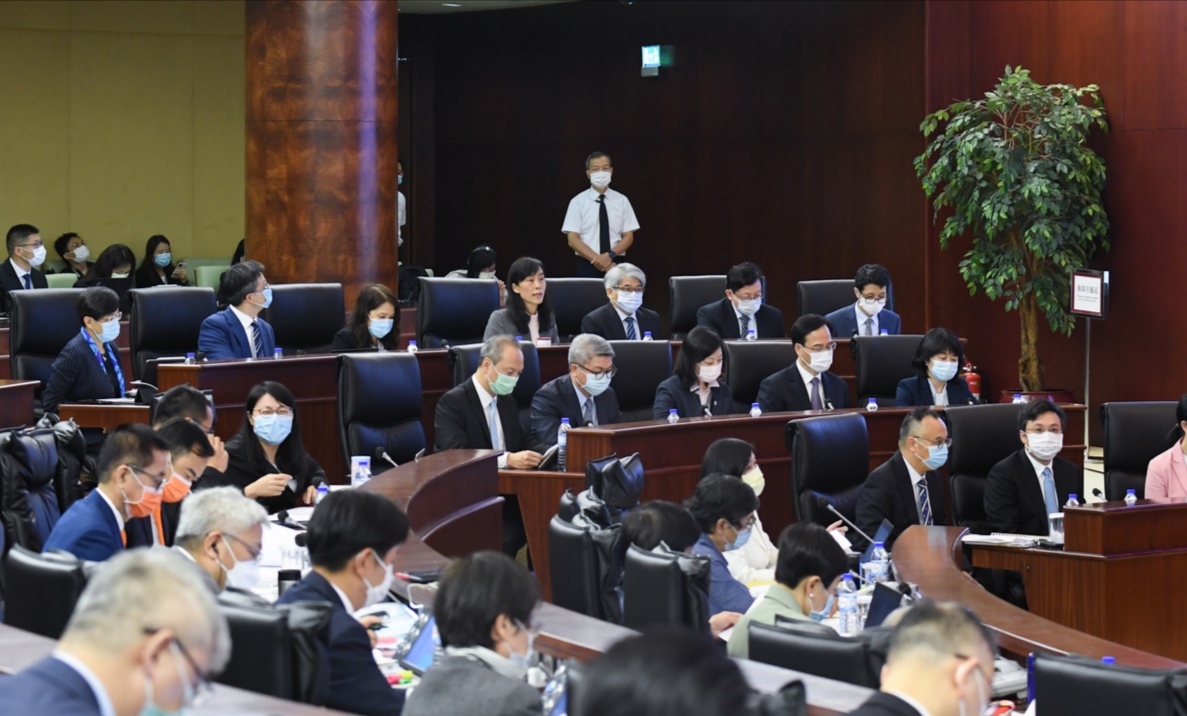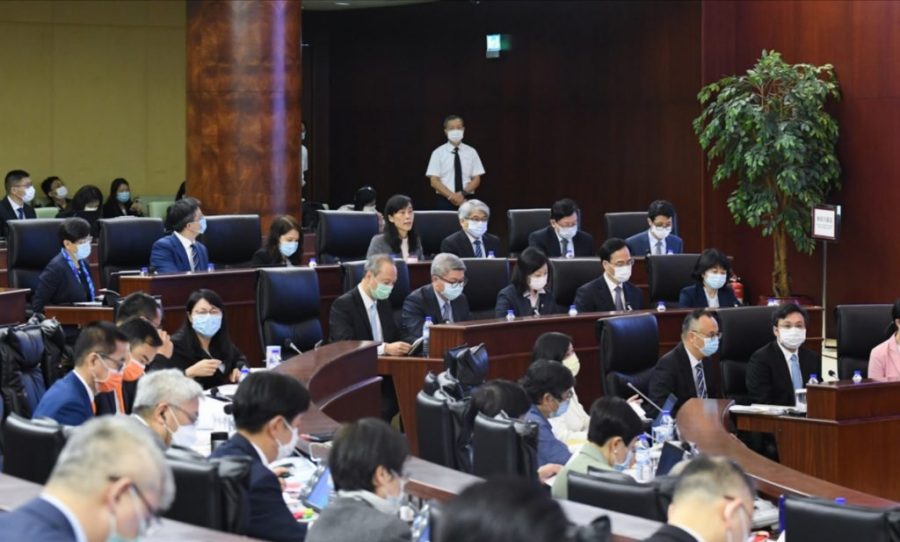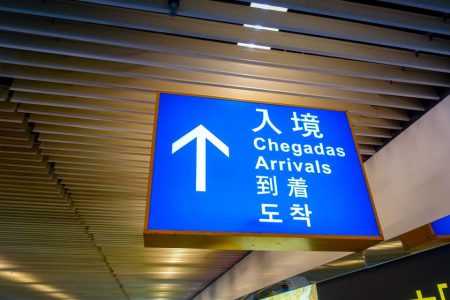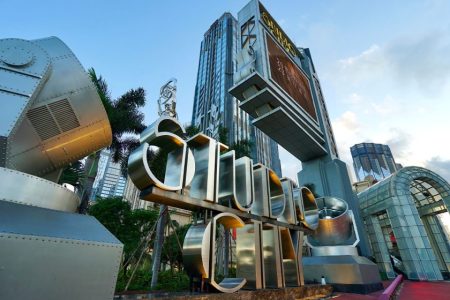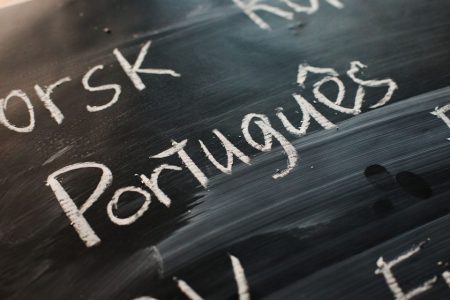School projects for ex-Canidrome also under review
Secretary for Social Affairs and Culture Elsie Ao Ieong U said on Monday that the government will study the suitability of turning the Old Courthouse in Nam Van into the city’s new Central Library and converting the old Hotel Estoril and its adjacent swimming pool into a youth recreation and activities centre, as well as building several schools on the former greyhound racetrack in Fai Chi Kei.
Ao Ieong made the remarks during a one-day Q&A session in the legislature’s hemicycle about her portfolio’s policy guidelines for this year.
Ao Ieong’s predecessor, Alexis Tam Chon Weng, was strongly pushing ahead with the three projects during his five-year term which lasted from December 2014 to December last year. The three planned projects, particularly the first two, have been controversial in civil society. Some lawmakers and civil leaders said it was not suitable for the new Central Library to be built in the busy city centre. Some activists said that the Estoril youth centre project would fail to protect the “cultural value” of the dilapidated hotel.
During Monday’s plenary session, appointed lawmaker-cum-civil engineer Wu Chou Kit noted that this year’s Policy Address does not mention any of the three projects.
Ao Ieong replied that after the publication of the government’s urban master plan in the near future, the government would study whether the three locations are suitable for the three projects. “Let’s wait for some time, before the publication of the urban master plan, after which we will announce our final decisions on the projects,” the policy secretary said.
Anti-COVID-19 work
In her introductory speech about her portfolio’s policy guidelines for this year, Ao Ieong said that the “sudden” emergence of the COVID-19 epidemic early this year had resulted in a “serious” test and a “huge” challenge for the new government – which took office on December 20 last year.
Over the past several months, the local government has promptly activated its prevention and control mechanism in response to threats to public health, she said. The local government has launched many rounds of its facemasks purchase scheme for local residents and non-resident workers, made “timely” adjustments to its entry restrictions and quarantine and medical observation measures in line with the changes in the epidemic in Macau and elsewhere, and implemented a raft of anti-COVID-19 measures concerning the operations of the city’s entertainment venues, the organisation of public events, the treatment of the novel coronavirus disease and the launch of anti-COVID-19 awareness campaigns in the community, she said.
Ao Ieong also said that the local government has ensured the adequate provision of medical facilities, protective gear for medical professionals, medicines and human resources. However, the current COVID-19 epidemic outside Macau still remains serious, the policy secretary said, adding that therefore the local government’s first major task remains to effectively prevent and control the COVID-19 epidemic and to restore life to normal as soon as possible.
Ao Ieong pledged that the local government will continue to closely monitor the changes in the COVID-19 epidemic in Macau and elsewhere, and take necessary epidemic prevention and control measures in a timely and effective manner. The local government will continue to strengthen health protection measures at the city’s border checkpoints, other designated venues and on public transport vehicles; to implement strict measures for the screening of the novel coronavirus disease, for the tracking of COVID-19 close contacts and other people; and for quarantine and medical observation, she said.
In her introductory speech, Ao Ieong also said that the government will also focus on relieving residents’ hardship resulting from the COVID-19 epidemic and stimulating local consumption. She said that the Social Welfare Bureau (IAS) will issue an additional two-month subsidy for low-income families that are currently receiving the bureau’s monthly low-income subsidy. In addition, the Health Bureau (SSM) will issue its annual health vouchers (600 patacas per person) – to which only permanent residents are entitled – twice this year, she said. Usually, the health vouchers are only issued once per annum.
According to Ao Ieong, the government will increase its funding to local schools for the purchase of hygiene items and facilities, and strengthen its financial support to the schools that are planning large-scale or urgent renovation projects. She said that the Cultural Affairs Bureau (IC) will exempt for one year local arts and cultural groups from paying fees for using the Macau Cultural Centre (CCM) in Nape.
Ao Ieong also pointed out that the Higher Education Bureau (DSES) will be merged with the Education and Youth Affairs Bureau (DSEJ) with the aim of “promoting the coordinated development of [the city’s] education. The government’s Cultural Industry Fund [FIC] will be merged with the Cultural Affairs Bureau [IC] for the “more effective planning” of the development of the city’s cultural sector. She also said that the government’s decision to move the Macau Government Tourism Office (MGTO) from her portfolio to the Secretariat for Economy and Finance portfolio will “promote the long-term development of Macau’s tourism industry.
Ao Ieong said that the local government will help Macau residents who hold a mainland residence permit to join the mainland’s basic medical insurance scheme.
Health centre projects
In her introductory speech, Ao Ieong also said that a health centre in the Praia do Manduco neighbourhood (known as Ha Van in Cantonese) near Barra in the Inner Harbour area will come into service in the second half of this year, featuring Traditional Chinese Medicine (TCM) and dental services.
Health Bureau (SSM) Director Lei Chin Ion said during Monday’s plenary session that the government expects a health centre project in Coloane’s Seac Pai Van public housing estate to be completed by the end of next year, adding that therefore the government will expand the area of the current temporary health station in the sprawling public housing estate – which will be replaced by the future permanent health centre at another location there – so as to meet the residents’ needs in the neighbourhood.
Lei also said that the government has decided to “reconsider” its project to rebuild the health centre near the Ponte 16 casino-hotel in the Inner Harbour area because its gross area would become smaller if the current reconstruction plan went ahead.
The Health Bureau currently has six health centres on the Macau peninsula, two health centres in Taipa, one health station in Coloane Village, and one temporary health station in the Seac Pai Van public housing estate on the same island.
Patriotic education base
In her introductory speech, Ao Ieong also said that the local government will establish a patriotic education base in Macau with an “unwavering” aim of promoting the city’s “loving the country and loving Macau” education, adding that the phased opening of the education base was expected to start by the end of this year.
Ao Ieong also said that the government will study the possibility of increasing the ratio of enrolling non-local students in the city’s higher education institutions.
In reply to directly-elected non-establishment lawmaker Sulu Sou Ka Hou, who questioned whether the city’s patriotic education would possibly involve “brainwashing”, Ao Ieong said that the local government’s patriotic education “is not just a slogan”, adding that instead the local government aims for young local people to “experience the country and Macau through their eyes and ears and to develop their passion for the country and Macau through their personal experience”.
Ao Ieong said that in addition to the raising of the national flag and the singing of the national anthem in local schools, the local government was also encouraging young people to participate in internships, exchanges and fact-finding trips in the mainland so that they could gain a better understanding of the nation’s latest development and its current governance. She also said that young local people have the ability to think independently.
Central provident fund
In her introductory speech, Ao Ieong also pledged that the government will promote the transition from the current implementation of its non-mandatory central provident fund into a mandatory one.
In reply to questions from several lawmakers, Ao Ieong pointed out that all of the city’s six gaming operators have joined the government’s non-mandatory central provident fund system, which was implemented in January 2018, but admitted that the city’s small- and medium-sized enterprises (SMEs) still have not been very eager to join the system.
Ao Ieong also pointed out that according to the law, the government will start reviewing the implementation of its non-mandatory central provident fund after this year, when the system will have been implemented for three years, before it will decide whether the system could become a mandatory one.
Facemask sales
Meanwhile, Ao Ieong also reaffirmed that the government will continue with its facemask purchase scheme this month, before reviewing the scheme by the end of this month so as to determine whether the scheme should continue next month.
Under the scheme, which was launched by the government on January 23, each local resident and non-resident worker is entitled to buy 10 facemasks at the fixed price of eight patacas (US$1) every 10 days at designated outlets upon presentation of their original Macau ID card or work permit (informally known as “blue card”). Parents or legal guardians are entitled to buy five child facemasks with the child’s ID cards, with the remaining five for adult facemasks. The facemasks for children are only for kids aged between three and eight.
The scheme, which has so far been running for the 11th round which started on Saturday, has been widely praised by residents.
International sports events every month
During Monday’s plenary session, Ao Ieong also said that the local government plans to organise an international sports event every month after the COVID-19 epidemic is over. She mentioned as possible events golf tournaments and volleyball and table tennis competitions. She also said that football matches involving teams from the Chinese mainland, Portuguese-speaking countries and Europe could also take place in Macau.
(The Macau Post Daily/Macau News)
PHOTO © Government Information Bureau (GCS)
